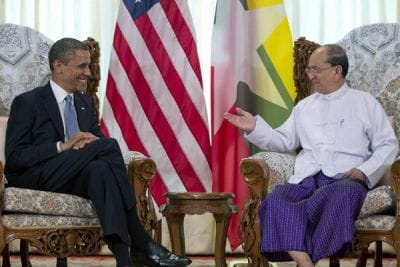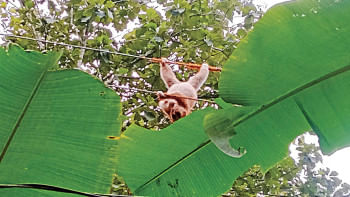US- Myanmar military engagement: A step to counter China?

Photo: AFP
The very fact that the US is seriously thinking to involve Myanmar to observe its joint military exercises with Thailand demonstrates amply how far relations between the United States and Myanmar have improved since President U Thein Sein took power 18 months ago..
President Thein Sein made a landmark trip to New York last month, becoming the first Myanmar leader to speak to the UN General Assembly, following a series of visits to Myanmar by US officials including Secretary of State Hillary Clinton.
The government has released hundreds of political prisoners, welcomed Nobel Peace laureate Daw Aung San Suu Kyi's opposition party back into mainstream politics and inked a series of ceasefire deals with ethnic minority rebels.
In response the United States and other Western countries have begun rolling back sanctions. Washington has also urged Myanmar to cut any military ties with North Korea. U Thein Sein's government has said that it will abide by UN resolutions banning weapons exports from the secretive communist state.
A 22-strong delegation, led by Assistant Secretary of State for Democracy, Michael Posner, that included Lt. Gen. Francis Wiercinski, the commanding general of the U.S. Army in the Pacific, recently visited Myanmar which would appear to be the first step toward a new relationship with Myanmar's military , one that could potentially provide the Southeast Asian country more leverage in dealing with larger neighbors, including China.
State media on October 18 said Deputy Minister for Defence Commodore Aung Thaw “led the discussion session in which the two sides held talks on levels and operations of defence institutions of Myanmar and US and exchanged views on future dialogue and bilateral cooperationâ€.
Other issues discussed included protection of civilians in conflict areas, provision of humanitarian assistance in those regions, the judicial system, the role of courts and judicial staff in the rule of law, issues related to prisoners, and the role of civil society, the New Light of Myanmar reported on October 18.
“This dialogue would promote mutual trust and bilateral ties between Myanmar and the United States of America,†Deputy Minister for Foreign Affairs U Zin Yaw was quoted as saying.
"In the past, Myanmar has always been unhappy about the US military exercises ( known as Cobra Gold), thinking that it was directed against them, said Dr Tin Maung Maung Than, a senior fellow at the Institute of Southeast Asian Studies in Singapore and an expert on Myanmar's military.
However, the military links between the two countries continued in the 80s. It is reported that some 255 Myanmar officers graduated from the United States from 1980 to 1988 under the International Military Education and Training programme, more than from any other country.. The programme was halted, and U.S. sanctions were imposed in 1990.
Against the above background, the United States plans to invite Myanmar to a major regional military exercise next year, with Thailand, reflecting a dramatic easing of tensions between the US and Myanmar, according to Myanmar Times of 22 October
“This dialogue would promote mutual trust and bilateral ties between Myanmar and the United States of America,†Deputy Minister for Foreign Affairs U Zin Yaw was quoted as saying.
The move would see Myanmar's military to join the annual Cobra Gold drills as an observer. Cobra Gold is the United States' largest multilateral exercise in the Asia-Pacific region. The joint military exercise involves more than 10,000 U.S. and Thai troops and other participants from countries in the region. Singapore, Japan, South Korea, Indonesia, and Malaysia are expected to participate next year along with 13 observer nations, Thai officials said.
“Myanmar is on the list of observers but it's not finalised yet,†Thai Defence Ministry spokesman Colonel Thanathip Sawangsang said on October 19, adding that the participants would discuss the idea at a meeting later this month.
The proposal to invite Myanmar was Washington's initiative, said a senior Thai military official who did not want to be named. “If all members agree ... it will become official,†he said.
However, US ambassador to Myanmar Derek Mitchell declined to comment on the report. Pentagon press secretary George Little told AP in Washington that Myanmar may be invited for the exercise, which normally takes place at the beginning of each year, but there has been no final decision.
In the longer term, a "military-to-military" partnership or dialogue is a definite possibility, according to U.S. Deputy Secretary of State William Burns, who visited the country recently on a separate tour through Asia, meeting with President Thein Sein and opposition leader Aung San Suu Kyi.
In a recent report, the Washington-based Centre for Strategic and International Studies called on the US government to “increase engagement with Myanmar's military … to provide training to a new generation of military officers in such areas as civilian-military relations, law of war, and transparencyâ€.
John Blaxland, a senior fellow at the Strategic and Defense Studies Centre Australian National University, said military engagement is critical for achieving a democratic, market-oriented state in Burma. An invitation amounts to a compliment to the military, which has long been isolated from its neighbors, and that the participation in these exercises, even as an observer, is important for regional stability in a Voice of America) article on 20th October.
He added “The authorities in Myanmar clearly want to diversify their strategic security relationships,†he said. “They have had a very close relationship with China in recent years, India has made overtures, they're part of Asean [Association of Southeast Asian Nations], so the opening up of the opportunity of participating in Cobra Gold is actually a very important step.â€
The proposed invitation by the US provides a new dimension of how far the US-Myanmar relations have come since the former military regime transformed itself when President Thein Sein came to power in March 2010. It's the latest signal that Myanmar's gradual reform process is providing new opportunities for Washington to pursue President Obama's Asia pivot strategy.
Observers believe China, which until recently had enjoyed a privileged position in the hierarchy of Myanmar foreign relations, will probably view this nascent military relationship with the US with great suspicion. Observers add that Washington's biggest military concern in Asia is reportedly China's growing and increasingly assertive armed forces, in particular in South China Sea.. America's regional allies have generally welcomed a renewed U.S. emphasis on Asia, which includes deepening existing partnerships and building new ones.

 For all latest news, follow The Daily Star's Google News channel.
For all latest news, follow The Daily Star's Google News channel. 



Comments